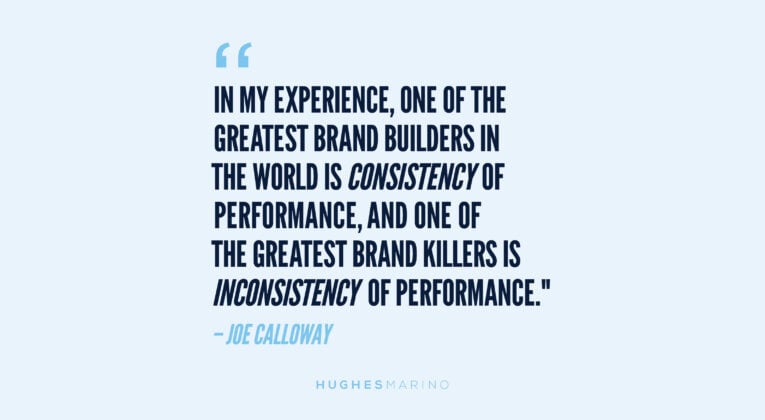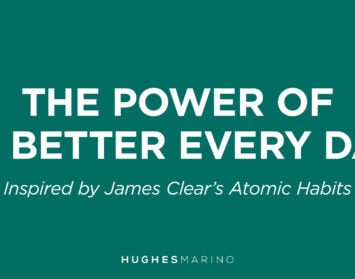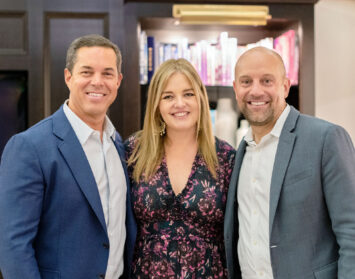Business strategist, author and long-time Hughes Marino coach Joe Calloway recently sat down with our team for a Q&A that left us inspired and wanting to share his wisdom with our clients and friends. Centered around one of many of Calloway’s books, Becoming a Category of One—which is also a favorite read of ours—we discussed the timeless principles for a thriving business, the evolving customer experience and the role of culture in organizational success.
Here are a few of the many valuable takeaways from our discussion:
Q: While Becoming a Category of One was originally published over two decades ago, the learnings and insights couldn’t be truer today. If you were to write another chapter, what would it be about?
A: The importance of being easy to work with. During my speeches at business conventions and events, I would ask business leaders: How much of a competitive advantage would it be if you were known in your industry, amongst all of your competitors, as the easiest to do business with? Of course, everyone emphatically agreed it would be an extreme competitive advantage. I’m an investor and work with a handful of startups, and the one thing that startups and major successful companies all have in common is that they make something easier to do. Take Uber—a mega-company now. What do they do? They make it easier to get a ride. Companies should ask themselves, do I make something easier to do and is my company/product easy to work with? To the extent that we can all make something easier to do, that is actually value creation, because the market values that tremendously.
Q: What do you think has changed most about the customer experience since you wrote the book?
A: There are a number of things that have changed, but the one that really comes to mind is time. More than ever. When does the customer want it? They want it now. Nobody wants to wait. If you make somebody wait unnecessarily in their mind, that’s a big, big competitive disadvantage. Take Amazon, for example. I order something in the morning and immediately receive an email with a delivery window for the same afternoon. That sets an expectation. And companies may say “Yeah, but I’m not Amazon, our expectations are different.” But customers might subconsciously be thinking, “If Amazon can get me that the same day, what’s up with you guys? Why have I been waiting for a return call for two days?” I think that’s been changing customer expectations immensely.
Q: What advice would you offer to leaders as they try to maintain their culture while navigating growth?
A: I think it’s a real challenge and a real opportunity, as most challenges stem from the culture part of the equation. One of the businesses that I focused on in Becoming a Category of One was Tractor Supply Company, because they are a very culture-driven business. I asked Joe Scarlett, company president at the time, how he dealt with maintaining their culture as they acquired new companies and hundreds of new employees over the years. I loved his answer, and will never forget what he said: “You know, the fact is we just talk about this stuff all the time.” I think this rings true with Hughes Marino as well. Hughes Marino does a great job with building, strengthening and maintaining its culture. You are great storytellers. You can recite your 10 core values, which is great as a baseline, but in team meetings you also discuss how you deliver excellence to clients and live those core values, which paints a great picture of what you’re all about. Your team members really get it and really start to internalize it.
Q: What advice would you offer to leaders as they navigate balancing hybrid and in-office work to create policies that balance team culture and productivity?
A: Overall, in-office/in-person work has its very strong advantages given the power of collaboration, mentorship, relationship-building, etc. And those are all fundamental keys to creating a strong brand, a strong culture and a stronger company. But with that said, the important thing is to examine the different pieces involved. Companies need to find their own balance between what makes the most sense for their customers, the type of business they are and their workforce. All three need to be considered with the backdrop of the benefits of being in-person.
Q: What do you think is the biggest brand builder for companies?
A: In my experience, one of the greatest brand builders in the world is consistency of performance, and one of the greatest brand killers is inconsistency of performance. It’s not easy to have a high standard company-wide. We’ve all done business with some companies that have employees that fall short of their brand standards. That’s a brand killer. It can’t depend on which employee you get. Yes, we should celebrate when we get a letter or an email from a customer complimenting a teammate for going above and beyond. But what we should focus on even more is receiving letters that say, I just want to let you know that no matter who I deal with in your company, it’s always a great experience. Boom. That’s the best. To me, one of the foundations of becoming a category of one brand is to strive for that consistency of performance.
Q: Currently, what brands do you believe rise to the level of a category of one? Who’s doing it really well?
A: I might surprise you with this because I’m going to give you kind of an everyman’s brand—Discount Tires. What this very successful company does that has made them a category of one to me is a lesson for any business, anywhere, which gets to the core of brand strength. While I have done business with other tire stores over the years, someone referred me to Discount Tires, and now any time anyone in my family needs tires, I go there. They sell pretty much the same kind of tires as everybody else and their pricing is also pretty much the same as everybody else. But one differentiator is that they make it super easy to make an appointment online, and they honor that appointment in-store, which is a big deal. Then, when I arrive at the store, a very personable associate acknowledges me very quickly, and if they’re behind, they will still give me an immediate response, so I know I’m not being ignored. They’re very professional, and they know their stuff. And they always have me out of there in 45 minutes to an hour. But here’s the key—every time I go, even if I get a different person, I get the same experience. Not that they’re robots. They don’t have scripted, clichéd lines that they use. Even when I go to a different location, a different store—same experience. Brand consistency at its finest. That’s a category of one!
Our thought-provoking conversation with Joe Calloway was a testament to the power of the fundamentals of business— ease, consistency and simplicity. In an era of constant change, these elements remain the key to success. As Hughes Marino and many other businesses continue to grow and evolve, the lessons from Becoming a Category of One serve as an essential guide to business success, no matter what industry you’re in or who your customers are!
Joe Calloway is an International Speakers Hall of Fame inductee and a best-selling author of nine books who has coached businesses for over 30 years, consulting with Fortune 100 companies and thousands of companies over his career to help them create and sustain success. Joe is also an investor in several growing and industry-leading companies, and resides with his family in Nashville, TN.









